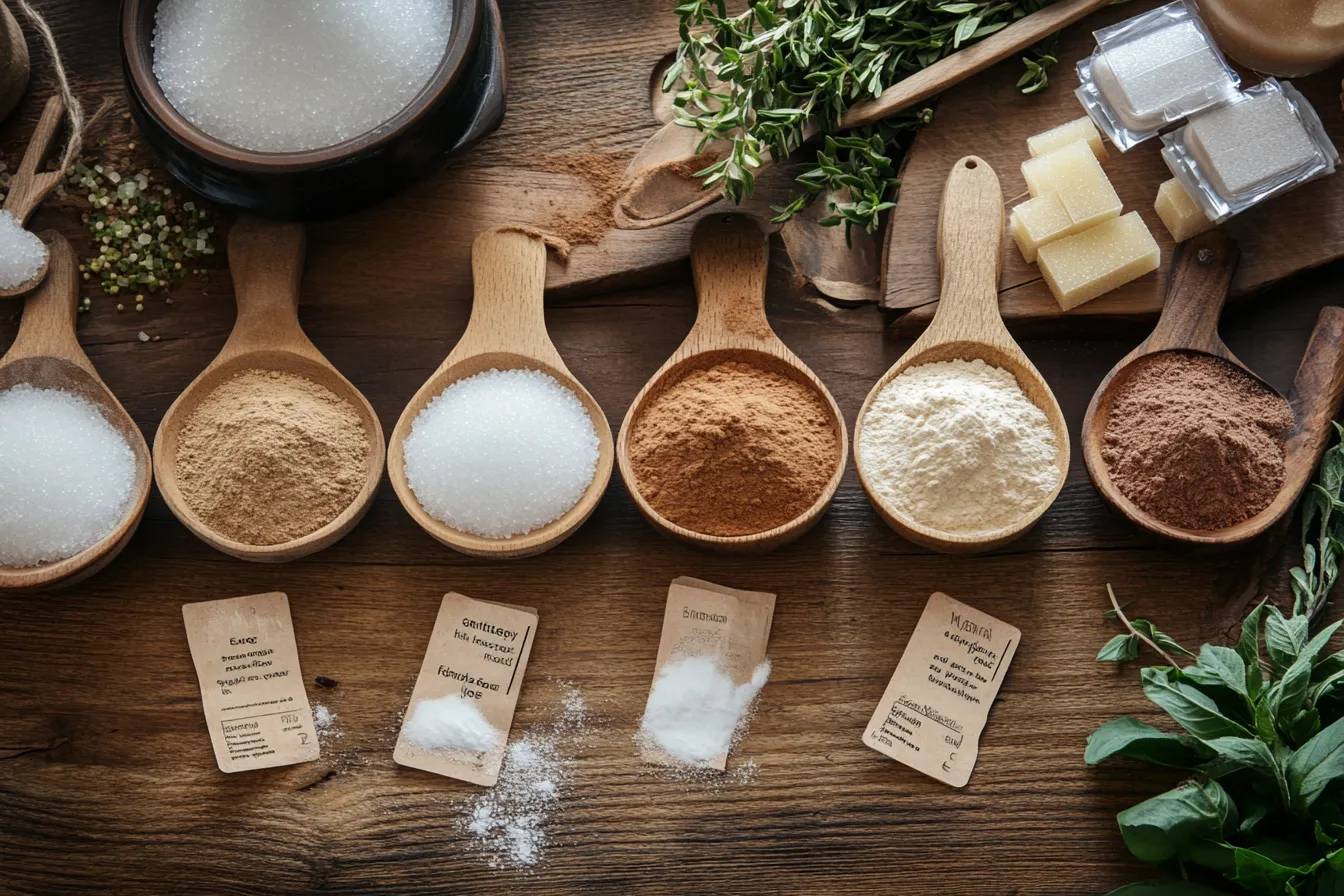Introduction
If you’ve ever tried to cut down on sugar, you know how hard it can be. From coffee to baked goods, sugar sneaks into almost everything we consume daily. But as people become more health-conscious, especially with rising rates of obesity, diabetes, and heart disease, the search for healthier options has intensified. That’s where sugar substitutes come in.
Sugar substitutes are sweetening agents that provide the taste of sugar without the same effects on blood glucose, calories, or dental health. Some are natural, like stevia and monk fruit, while others are synthetic, such as aspartame or sucralose. These alternatives have gained popularity in diets like keto, diabetic-friendly eating, and weight management plans..Pink Salt Weight Loss Recipe
Whether you’re managing type 1 or type 2 diabetes, aiming for weight loss, or simply trying to reduce your sugar intake, understanding the right sugar substitute for your needs can make a significant difference in your health journey. In this guide, we’ll explore everything from types of sugar substitutes, their health benefits, how to use them, and potential risks — all with a focus on practical advice, real-life usage tips, and science-backed facts.
By the end of this article, you’ll have a clear, evidence-based understanding of which sugar substitute is best for your lifestyle.
What Is a Sugar Substitute?
Definition & Importance
A sugar substitute is any food additive that duplicates the effect of sugar in taste, but typically has fewer calories or a different effect on blood sugar levels. These substitutes may be natural (extracted from plants) or artificial (man-made in labs), and are often used in foods and beverages to reduce calorie count or make products safe for individuals with blood sugar concerns.
The rise of sugar substitutes is largely driven by growing awareness about the dangers of excessive sugar consumption, including obesity, diabetes, fatty liver, and metabolic syndrome. The World Health Organization recommends that adults consume no more than 25 grams (about 6 teaspoons) of added sugar per day. That’s not much — especially considering a single can of soda contains nearly 40 grams.
Natural vs. Artificial Sweeteners
Sugar substitutes fall into three major categories:
- Natural Sweeteners – Sourced from plants or fruits, such as stevia, monk fruit, and erythritol.
- Artificial Sweeteners – Chemically synthesized to mimic the sweetness of sugar, including sucralose, aspartame, and saccharin.
- Sugar Alcohols – Technically neither sugars nor alcohols, these occur naturally in fruits and vegetables (e.g., xylitol and maltitol).
Each category has pros and cons based on factors like glycemic index, aftertaste, heat stability for cooking, and digestive effects. Some mimic sugar closely with minimal impact on blood sugar, while others may cause digestive discomfort if consumed in excess..Lemonade Recipe
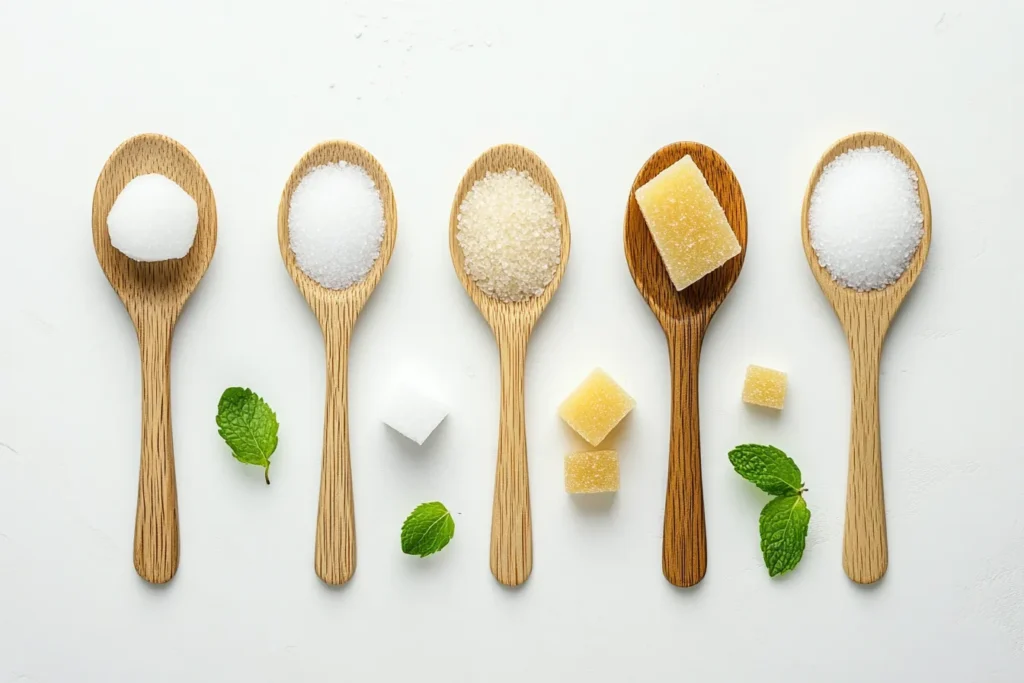
Health Benefits of Using Sugar Substitutes
Lowering Caloric Intake
One of the most well-known benefits of using sugar substitutes is reducing overall calorie consumption. Unlike regular table sugar, which contains about 16 calories per teaspoon, most artificial and some natural substitutes contain very few or even zero calories.
This can be a game-changer for individuals trying to lose weight or maintain a healthy body weight. By swapping sugar for a low-calorie alternative in beverages, desserts, or even sauces, you can significantly cut back on your daily caloric intake without sacrificing taste. This makes sugar substitutes a valuable tool in calorie-controlled diets like keto, intermittent fasting, and low-carb plans.
Moreover, consuming fewer calories from sugar also reduces the risk of developing metabolic disorders, such as non-alcoholic fatty liver disease or insulin resistance. This is particularly relevant in regions where sugar-sweetened beverages and snacks contribute heavily to daily energy intake.
Impact on Blood Sugar & Diabetes Management
For people with type 1 or type 2 diabetes, managing blood glucose levels is critical. Traditional sugar causes rapid spikes in blood sugar, which can be harmful over time. Sugar substitutes, especially those that are non-glycemic, provide a sweet flavor without triggering a glucose response.
Several natural sweeteners like stevia and monk fruit have a glycemic index (GI) of zero, meaning they don’t affect blood sugar levels at all. This makes them ideal for diabetic-friendly recipes and daily use.
Type 1 vs. Type 2 Diabetes Considerations
- Type 1 Diabetes: Individuals with type 1 diabetes require careful monitoring of carbohydrate intake. Because sugar substitutes don’t contain digestible carbs, they can be used to sweeten foods and drinks without increasing insulin dosage.
- Type 2 Diabetes: Sugar substitutes can help reduce insulin resistance over time by lowering daily sugar consumption. They may also assist in weight loss, which is often recommended for type 2 diabetic management.
In fact, the American Diabetes Association supports the use of certain sugar substitutes as a safe way to reduce added sugars in the diet while maintaining flavor and satisfaction..Matcha Iced Latte Recipe
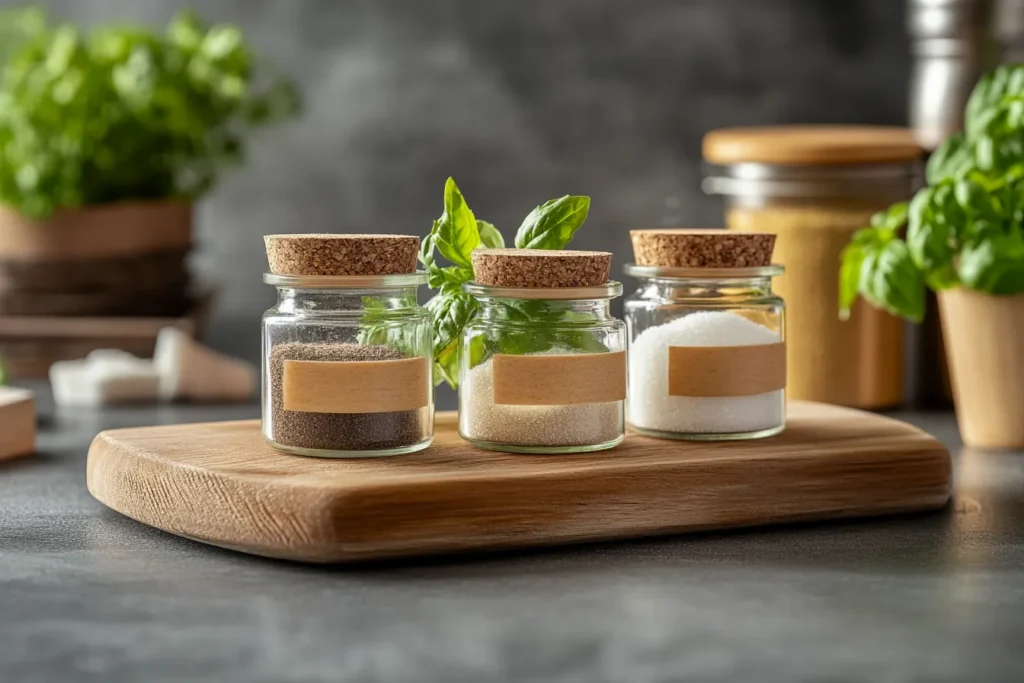
Types of Sugar Substitutes
There’s no one-size-fits-all when it comes to sugar substitutes. Some are ideal for baking, while others work better in cold drinks. Let’s dive into the natural sugar substitutes first.
Natural Sweeteners
Natural sweeteners are derived from plants or fruits and are often less processed than their artificial counterparts. They’re favored by many for being more “wholesome,” although that doesn’t always mean they’re nutritionally superior.
Stevia
Stevia is a plant-based sweetener extracted from the leaves of the Stevia rebaudiana plant. It is 200–300 times sweeter than sugar, so only a small amount is needed. Stevia contains zero calories and has a glycemic index of zero, making it a top choice for diabetics and weight watchers alike.
✅ Pros:
- No calories or carbs
- Doesn’t raise blood sugar
- Heat stable (great for baking)
⚠️ Cons:
- May have a bitter or licorice-like aftertaste
- Some people report bloating or gas with high intake
Monk Fruit (Luo Han Guo)
Monk fruit is another natural sweetener derived from a Southeast Asian melon. It contains compounds called mogrosides, which provide the sweet taste without affecting blood glucose. Monk fruit is 150–200 times sweeter than sugar, has no calories, and no known side effects.
✅ Pros:
- Great for diabetics
- No GI impact
- No bitter aftertaste
⚠️ Cons:
- Can be expensive
- Often blended with other sweeteners (read labels carefully)
Erythritol
Erythritol is a sugar alcohol found naturally in fruits like pears and grapes. Though technically a sugar alcohol, it’s commonly grouped with natural sweeteners because it’s fermented from corn or wheat starch. It has about 70% the sweetness of sugar and contains 0.24 calories per gram, which is nearly zero.
✅ Pros:
- Doesn’t spike blood sugar or insulin
- Feels and tastes like sugar
- Minimal digestive issues compared to other sugar alcohols
⚠️ Cons:
- In high amounts, may cause bloating or nausea
- Can crystallize in cold recipes
Artificial Sweeteners
Artificial sweeteners are synthetic sugar alternatives that provide intense sweetness without calories or carbohydrates. They are regulated by the FDA and are often labeled as non-nutritive sweeteners because they contribute little or no energy to the diet. These sweeteners are widely used in soft drinks, sugar-free gum, packaged snacks, and diet products.
Aspartame
Aspartame is about 200 times sweeter than sugar and is made from amino acids. It is commonly found in products like Diet Coke, sugar-free yogurts, and chewing gum.
✅ Pros:
- Very low-calorie
- Safe for diabetics
- Heat-sensitive, so better for cold recipes
⚠️ Cons:
- Not suitable for people with phenylketonuria (PKU)
- May break down at high cooking temperatures
- Linked to headaches in sensitive individuals
Sucralose (Splenda)
Sucralose is about 600 times sweeter than sugar and is known for being heat-stable, making it one of the few artificial sweeteners suitable for baking. It’s commonly used in processed foods and beverages and sold under the brand name Splenda.
✅ Pros:
- Suitable for cooking and baking
- No effect on blood glucose
- Long shelf-life
⚠️ Cons:
- Some research suggests it may alter gut microbiome
- Can have a slightly chemical aftertaste
Saccharin
Saccharin was one of the first artificial sweeteners discovered and is 300–400 times sweeter than sugar. Though controversial in the past, extensive reviews have led to its approval as safe by multiple health authorities.
✅ Pros:
- Zero calories
- Long shelf life
- Strong sweet taste
⚠️ Cons:
- Bitter aftertaste
- Not suitable for all cooking applications
Sugar Alcohols
Though the word “alcohol” may cause concern, sugar alcohols are not intoxicating. They’re carbohydrates that occur naturally in some fruits and vegetables, but are usually industrially manufactured for use in food.
Xylitol
Xylitol is nearly as sweet as sugar and is often found in sugar-free chewing gum and oral care products because it helps prevent tooth decay.
✅ Pros:
- Dental health benefits
- Low GI (around 7)
- Tastes like sugar
⚠️ Cons:
- Can cause digestive issues (bloating, diarrhea) in high amounts
- Toxic to dogs — keep away from pets
Maltitol
Maltitol is often used in low-carb and sugar-free candies. It has about 70% the sweetness of sugar, with fewer calories.
✅ Pros:
- Cost-effective for manufacturers
- Mild aftertaste
⚠️ Cons:
- High consumption can cause gas and laxative effects
- Raises blood sugar slightly more than other sugar alcohols
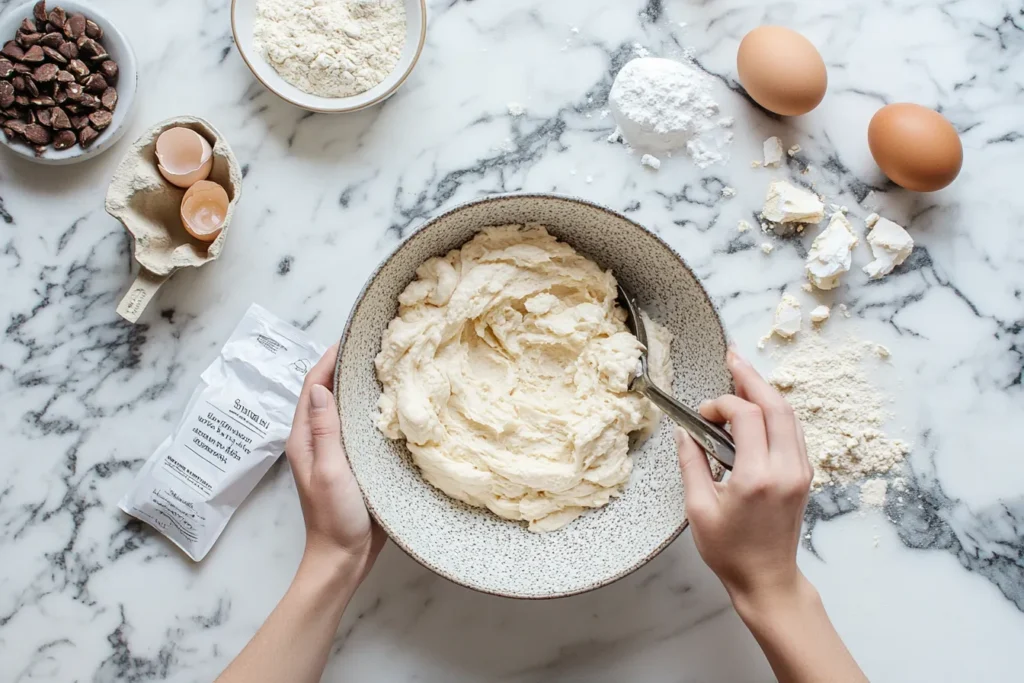
How to Choose the Right Substitute
Taste Profile & Baking Behavior
When selecting a sugar substitute, consider the taste and texture you’re aiming for. Some alternatives like stevia or saccharin have a bitter or metallic aftertaste. Others like erythritol and xylitol are more sugar-like in flavor and mouthfeel.
If you’re baking, opt for sweeteners that are heat-stable, like sucralose or monk fruit blends. Substitutes that degrade under heat, such as aspartame, are better for cold uses like smoothies or yogurt.
Safety & FDA Guidelines
Always verify that the sugar substitute you’re using is FDA-approved and generally recognized as safe (GRAS). Most mainstream options, including stevia, sucralose, and erythritol, are backed by substantial safety data. However, keep in mind:
- Individuals with PKU should avoid aspartame
- Sugar alcohols may cause digestive discomfort
- Pregnant or breastfeeding individuals should consult a doctor before switching entirely
Cost & Availability
Some natural sugar substitutes like monk fruit or pure stevia extract tend to be more expensive and are not available in every grocery store. Meanwhile, products like sucralose and aspartame are widely available and budget-friendly.
To save money, consider bulk buying or choosing blended sweeteners, which often combine the best features of two or more sugar substitutes for a better taste and cost balance.
Potential Side Effects & Considerations
While sugar substitutes offer many benefits, they are not completely free of concerns. It’s important to understand potential side effects and how individual responses can vary.
Gut Health & Digestive Impact
One of the most commonly reported issues with certain sugar substitutes—especially sugar alcohols like xylitol, sorbitol, and maltitol—is digestive discomfort. These compounds are only partially absorbed in the small intestine. As a result, they ferment in the colon, which can lead to:
- Bloating
- Gas
- Diarrhea
- Cramping
For people with irritable bowel syndrome (IBS) or other gastrointestinal sensitivities, sugar alcohols may exacerbate symptoms. Even naturally safe choices like erythritol, though gentler, may still cause discomfort if consumed in large quantities.
Allergens & Sensitivities
Artificial sweeteners like aspartame have been linked—though rarely—to headaches and migraines in some individuals. While these effects aren’t experienced universally, they are worth noting if you have a history of sensitivity to chemical compounds.
Additionally:
- Those with phenylketonuria (PKU) must strictly avoid aspartame due to its phenylalanine content.
- Sucralose, while widely used, has raised some concern over long-term gut microbiome changes, although more research is needed.
- People allergic to ragweed may react to stevia, which comes from a related plant family.
Pro Tip: When trying a new sugar substitute, start with a small amount to test your body’s response.
How to Incorporate Sugar Substitutes Into Your Diet
Once you’ve selected the right sugar substitute, the next step is learning how to integrate it seamlessly into your meals and daily routine.
Recipes & Practical Usage Tips
Most sugar substitutes can be used in a 1:1 ratio, but some are more potent than others. For example, stevia and monk fruit are significantly sweeter than sugar and require adjustments in recipes.
Baking Tips:
- If using erythritol, combine it with a moist ingredient (like applesauce or yogurt) to offset dryness.
- With sucralose, use blends designed for baking to avoid aftertaste or density issues.
- When working with monk fruit, opt for blended varieties that mimic sugar’s texture.
Drink Tips:
- Stevia drops or monk fruit powder are excellent in coffee and tea.
- Add xylitol or erythritol to smoothies or shakes for a sweet boost without sugar.
Everyday Substitutions:
| Use Case | Sugar Substitute Suggestion |
|---|---|
| Coffee & Tea | Stevia drops, Monk Fruit |
| Baking Cakes | Sucralose, Erythritol blend |
| Yogurt Mix-ins | Xylitol, Monk Fruit |
| Salad Dressings | Stevia, Erythritol |
| Smoothies | Erythritol, Xylitol |
Transition Strategies
If you’re used to consuming a lot of sugar, it’s wise to transition gradually to sugar substitutes. A sudden shift might not only alter the flavor of your favorite foods but could also lead to digestive symptoms if overconsumed.
Start by:
- Replacing sugar in beverages first.
- Trying half-and-half blends of sugar + substitute in recipes.
- Experimenting with different types to find one that suits your palate.
Bonus Tip: Read labels carefully. Some “sugar-free” or “keto” products still contain small amounts of dextrose or maltodextrin, which can affect blood sugar.

FAQs About Sugar Substitute
Is a sugar substitute healthier than sugar?
In most cases, yes — especially when it comes to weight management and blood sugar control. Traditional sugar is high in calories and raises blood glucose levels quickly. On the other hand, most sugar substitutes contain fewer or zero calories, have a lower glycemic impact, and do not promote tooth decay.
However, “healthier” can be subjective. Some artificial sweeteners have raised concerns about long-term safety and possible gut health issues. That said, FDA-approved substitutes like stevia, sucralose, and erythritol are considered safe when consumed in moderation.
Does a sugar substitute raise blood sugar?
This depends on the type of sugar substitute:
- Non-nutritive sweeteners like stevia, sucralose, and monk fruit generally do not raise blood glucose at all. These are ideal for people with diabetes or pre-diabetes.
- Sugar alcohols like xylitol or maltitol have a mild effect on blood sugar and should be consumed cautiously by diabetics.
- Artificial sweeteners like aspartame also have minimal to no effect on blood sugar.
Always check the label, as some products marketed as “sugar-free” still contain trace carbs or sugars that could affect blood sugar.
Are sugar substitutes safe for children and during pregnancy?
Most FDA-approved sugar substitutes are considered safe for children and pregnant women when consumed within recommended limits. For example:
- Stevia and erythritol have been extensively tested and found to be safe.
- Aspartame should be avoided by individuals with PKU.
- Some experts recommend limiting artificial sweeteners during pregnancy as a precaution, even if no direct evidence links them to harm.
Parents should also watch portion sizes, especially when using sugar alcohols, which may cause bloating or digestive discomfort in younger children.
Can I use sugar substitutes in baking and cooking?
Yes, but not all sugar substitutes behave the same in heat or in recipes.
- Sucralose is heat-stable and ideal for baking cookies, cakes, and muffins.
- Stevia and monk fruit are more stable at moderate temperatures but may leave an aftertaste.
- Erythritol and xylitol perform well in baking, but you may need to adjust liquid ingredients to avoid dryness.
Keep in mind that sugar also contributes to texture and browning in baked goods, so using 100% substitute may slightly alter your results.
How do I measure sugar substitutes accurately?
Sugar substitutes often vary in sweetness:
- Stevia is 200–300 times sweeter than sugar
- Monk fruit is around 150–200 times sweeter
- Erythritol is 70% as sweet as sugar
- Xylitol is roughly equal to sugar in sweetness
Look for conversion charts or choose sugar substitutes marketed as “cup-for-cup” replacements. These blends are formulated to match sugar in volume and sweetness, making them perfect for recipes.
Are there long-term risks associated with sugar substitutes?
Studies have shown that moderate use of approved sugar substitutes is safe. However, excessive intake of artificial sweeteners has been linked to concerns such as:
- Changes in gut microbiota
- Increased cravings for sweet foods
- Possible metabolic changes (though evidence is mixed)
Natural options like stevia and monk fruit have fewer long-term concerns and are generally regarded as the safest among all sweetener types. As with anything, moderation is key.
Conclusion
As health awareness continues to rise globally, more people are rethinking their sugar intake and looking for smarter, safer, and sweeter alternatives. Sugar substitutes offer a promising solution for those looking to manage blood sugar, cut calories, improve dental health, and even bake smarter.
From natural options like stevia, monk fruit, and erythritol, to artificial sweeteners such as sucralose and aspartame, the key lies in choosing the substitute that best fits your health goals, dietary needs, and taste preferences. And while sugar substitutes can offer major benefits, it’s still important to consume them in moderation and be aware of any individual sensitivities or digestive reactions.
Whether you’re living with diabetes, aiming to lose weight, or just want to make more mindful eating choices, sugar substitutes can be a powerful tool in your nutritional toolkit. Pair this with smart reading of food labels, awareness of sweetener blends, and experimenting with recipes, and you’re on your way to a healthier, balanced lifestyle — without giving up the sweet things you love.
- American Diabetes Association – “Sugar Substitutes”
Anchor Text: Safe sugar substitutes for diabetics
URL: https://diabetes.org/healthy-living/recipes-nutrition/sugar-substitutes - Mayo Clinic – “Artificial sweeteners and other sugar substitutes”
Anchor Text: Artificial sweetener safety and side effects
URL: https://www.mayoclinic.org/healthy-lifestyle/nutrition-and-healthy-eating/in-depth/artificial-sweeteners/art-20046936 - WebMD – “Guide to Sugar Substitutes”
Anchor Text: Comprehensive guide on sugar alcohols
URL: https://www.webmd.com/diet/sugar-substitutes
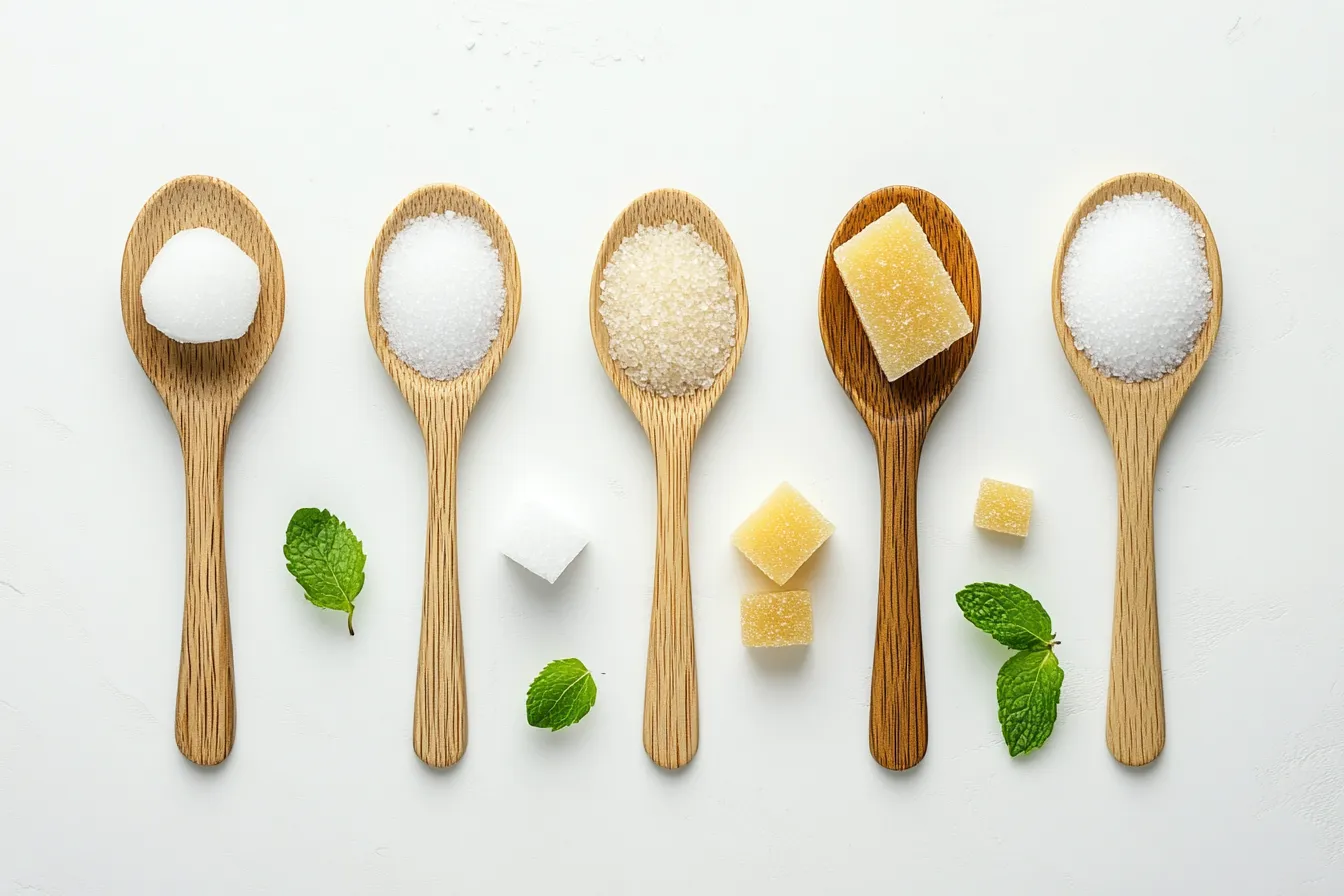
Name: Homemade Sugar Substitute Blend
Ingredients
Equipment
Method
- Instructions:
- In a clean bowl, combine erythritol, stevia powder, and monk fruit extract.
- Whisk together gently to evenly distribute all sweeteners.
- Pour the mixture into an airtight container and store in a cool, dry place.
- Use in place of sugar in a 1:1 ratio for beverages. For baking, adjust to taste.

